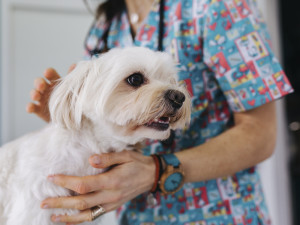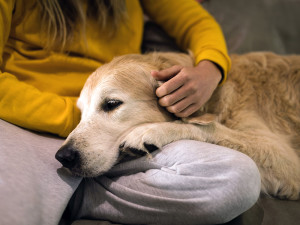Can Dogs Get the Flu from Humans?
Or is it OK to snuggle them close while we recover?
In This Article:
Can Dogs Get The Flu Virus from Humans? Do Dogs Get the Flu? Sign of Dog Flu Dog Flu vs. Other Illnesses Frequently Asked Questions
There aren’t many great things about being sick, but one of them is that you can snuggle up with your pup while you sip your soup and tea. But will you get them sick if you do that? Dogs can contract certain strains of influenza from humans, a phenomenon known as “reverse zoonosis.” However, human flu viruses typically do not cause symptoms in dogs. Because of this, canine influenza is a much bigger concern in dogs, and you shouldn’t be too worried about giving your illness to your pup, though there are other caveats to consider.
Can dogs get the flu virus from humans?
Being sick is no fun. The question, “Can dogs get the flu from humans at home?” is a little complicated. While dogs can get infected with some strains of the human influenza virus, it’s exceedingly uncommon for them to develop any illness from human flu viruses. This means it’s possible for your dog to silently spread the flu to other people who come in close contact with them for up to 10 days after infection.
Despite this, dogs are not considered to be a major reservoir host for the human flu. Dog-to-human flu transmission is not well-documented and is not considered a significant source of human-flu infections. To be safe, it’s probably best to keep your dog out of other people’s faces for a week or two if they’ve helped support you through the flu recently.
How much do you spend on your pet per year?
Do dogs get the flu?
Dogs can get sick from the flu, but it’s a different variant than the ones humans get. The good news is that these dog flu viruses aren’t readily transmitted to people, so your dog won’t get you sick with the flu.
What is canine influenza?
There are two recognized canine influenza strains, both of which are influenza A viruses, which are commonly seen in animals.
The H3N8 variant was first recognized in 2004. It was first seen as an outbreak of respiratory illness at a Greyhound track in Florida and is a mutation of an equine influenza virus.
The H3N2 variant was first seen in the US in 2015, but likely originated in Asia around a decade earlier. It is derived from an avian influenza virus and may have been introduced to the U.S. by a single dog brought to Chicago from South Korea.
Intermittent outbreaks of both of these variants have been documented in the U.S., and the virus has been found in almost every state. Fortunately, routine spread of dog flu is uncommon, and most cases can be traced back to events or facilities with a high concentration of dogs.
Do dogs get the stomach flu?
Flu-stricken dog parents may wonder Can dogs get the stomach flu from humans? if their pup starts to show symptoms of vomiting or diarrhea. Dogs don’t get the stomach flu from people, and canine influenza causes respiratory problems, not gastrointestinal symptoms. Don’t ignore it if your dog has an upset stomach, but don’t blame yourself for spreading the flu to them, either.
How do dogs get the dog flu?
Canine influenza is spread primarily through aerosol transmission. This means that every time an infected dog coughs or sneezes, they’re shooting off countless viral particles that can infect other dogs. Because it’s pretty tough to teach a dog to wear a mask or cover their face when they sneeze, isolation of dogs sick with the flu is key to preventing spread. Fortunately, dog flu strains have relatively low transmissibility, meaning situations with a high number of dogs in a limited space are usually required for outbreaks to occur.
Canine influenza can also be spread by direct contact (nose-to-nose, mouth-to-nose) or via contaminated bedding or clothing transferred between dogs. Practice good hygiene after handling a sick dog and make sure to clean surfaces or other materials before other dogs are exposed to them.
Is there a dog flu vaccine?
There are multiple canine influenza vaccines available. Some cover just one strain of the flu, while others cover both variants. Canine flu vaccines aren’t part of the core vaccination series for dogs, so they’re most commonly given to dogs that will be in situations that carry a higher risk for flu transmission. Most dog-flu outbreaks have been associated with situations that bring a number of dogs together, such as:
Dog shows
Boarding facilities
Doggy day care
Animal shelters
Agility competitions
If there are reports of canine influenza in your area and you know your dog will be in a potentially risky situation, discuss vaccinating for the fluopens in new tab with your veterinarian. Your vet can guide you on if vaccination is needed and which vaccine is right for your dog. Be sure to plan ahead: the dog flu vaccine is a series of two shots given three to four weeks apart. Your dog isn’t protected against the flu for seven to 10 days after the second shot, which means you need to be thinking about vaccination at least a month before an event.
Flu vaccines don’t reliably prevent infection or the shedding of flu viruses. They do give good protection against severe disease though. Although vaccinated dogs can still get canine influenza, their symptoms tend to be mild.
Signs of dog flu
Canine influenza symptoms are primarily respiratory. Dogs don’t suffer from the same GI upset symptoms that make the human flu so miserable. Even though the range of symptoms of dog flu is more limited, it can still be dangerous. Dogs with the flu need to be monitored closely for signs of progression, and treatment must be started quickly if things progress past simple upper respiratory signs.
Some common dog flu symptoms include:
Coughing and sneezing
Coughing and sneezing are some of the most common and easily recognized symptoms of canine influenza. The cough is often described as being soft and moist, though this can vary based on the stage and extent of the disease. Because these symptoms are shared with many other diseases, testing is necessary to diagnose dog flu.
Nasal discharge
Just like the human flu, canine influenza can cause a runny nose. The discharge is usually clear in the early stages of the flu, but it may turn thick and greenish if a secondary bacterial infection develops. Nasal discharge can be accompanied by ocular discharge and red eyes as well.
Fever
Most dogs with the flu never progress past coughing, sneezing, and a runny nose. Dogs with a more severe flu infection can develop a high fever (over 104 degrees Fahrenheit). Monitoring your dog’s temperature can help you tell if their illness is worsening. If your dog has the flu and develops a fever, contact a vet immediately to discuss more intensive care.
Decreased appetite
Dogs with mild flu symptoms usually keep eating despite their coughing and runny nose. Loss of appetite can be a sign of a more severe form of illness. A decreased appetite may be accompanied by lethargy and difficulty breathing.
Shortness of breath
Dogs with severe flu infections can develop pneumonia. Pneumonia can be quite dangerous and may progress quickly. In addition to rapid or labored breathing, dogs with pneumonia may have pale or bluish gums, increased respiratory noise, weakness, or cough up bloody phlegm. Overall mortality rates for dog flu are low (less than two percent for previously healthy dogs), but fever and pneumonia due to dog flu can progress rapidly and lead to death within hours.
Dog flu vs. other illnesses
Kennel cough vs. canine influenza
Kennel cough is kind of like the dog version of the common cold. This disease complex is caused by viruses, bacteria, or a combination of both, and it tends to resolve on its own over a week or two. Canine influenza viruses are some of the possible viral causes of kennel cough. The specific virus or bacteria causing illness isn’t often diagnosed because the symptoms of a mild case of kennel cough look about the same: coughing, sneezing, runny nose. It’s only when more severe signs develop that your veterinarian may want to go looking for the cause to see if additional treatments or diagnostics are needed.
Allergies vs. dog flu
Dogs can be allergic to just about anything they come into contact with. Many dog allergies show up as skin problems, but some can cause respiratory symptoms. Respiratory dog allergies are often seasonal due to pollen or other materials in the air. Dogs with seasonal respiratory allergies tend to develop sneezing and clear nasal discharge with minimal coughing.
Bronchitis vs. dog flu
The triggers for chronic bronchitis can include allergies, but other causes are possible. Dogs with chronic bronchitis will often have a chronic cough that intermittently worsens. Parents of dogs with chronic bronchitis are usually attuned to their dog’s typical cough and may recognize a change in frequency or character that could indicate an infection.
FAQs (People also ask):
Can humans get dogs sick?
There are some diseases that can be spread from humans to dogs, but they are fortunately uncommon. People with tuberculosis, MRSA infections, ringworm, or salmonellosis should take precautions when handling their dogs.
Can dogs get colds?
Dogs can get upper respiratory infections, which are commonly referred to as kennel cough. Kennel cough has both bacterial and viral causes, and it can spread between dogs.
References:
CDC. “About Dog Flu.” Influenza in Animals, 17 Oct. 2024, www.cdc.gov/flu-in-animals/about/canine-flu.html?CDC_AAref_Val=www.cdc.gov/flu/other/canine-flu/keyfacts.html. Accessed 18 Nov. 2024.
Dunn, Danielle, et al. “Outcomes of and Risk Factors for Presumed Canine H3N2 Influenza Virus Infection in a Metropolitan Outbreak.” Journal of the American Veterinary Medical Association, vol. 252, no. 8, 15 Apr. 2018, pp. 959–965, https://doi.org/10.2460/javma.252.8.959. Accessed 18 Nov. 2024.
Sekine, Wataru, et al. “Adaptation Potential of H3N8 Canine Influenza Virus in Human Respiratory Cells.” Scientific Reports, vol. 14, no. 1, 13 Aug. 2024, www.nature.com/articles/s41598-024-69509-x, https://doi.org/10.1038/s41598-024-69509-x. Accessed 18 Nov. 2024.
Song, Daesub, et al. “Canine Susceptibility to Human Influenza Viruses (A/Pdm 09H1N1, A/H3N2 and B).” Journal of General Virology, vol. 96, no. 2, 13 Oct. 2014, pp. 254–258, https://doi.org/10.1099/vir.0.070821-0. Accessed 18 Nov. 2024.
Tonozzi, Caroline C. “Canine Influenza (Flu) - Respiratory System.” MSD Veterinary Manual, www.msdvetmanual.com/respiratory-system/respiratory-diseases-of-small-animals/canine-influenza-flu. Accessed 18 Nov. 2024.
Voorhees, Ian E.H., et al. “Spread of Canine Influenza A(H3N2) Virus, United States.” Emerging Infectious Diseases, vol. 23, no. 12, Dec. 2017, pp. 1950–1957, https://doi.org/10.3201/eid2312.170246. Accessed 18 Nov. 2024.
Weese, J. Scott, et al. “Emergence and Containment of Canine Influenza Virus A(H3N2), Ontario, Canada, 2017–2018.” Emerging Infectious Diseases, vol. 25, no. 10, Oct. 2019, pp. 1810–1816, https://doi.org/10.3201/eid2510.190196. Accessed 18 Nov. 2024.
